Wendy Betteridge told us about her childhood and upbringing this evening.
My father left England to work in India before the Second World War broke out. All the women on my mother’s side of the family have been strong and independent. My maternal grandmother was a powerful force and expected to be obeyed! How my mother defied her in 1940 at the age of 19 to leave England on the last passenger plane for India to be with my father, I can’t imagine, but leave she did and they married almost as soon as she arrived. By the time she got there he had joined the Royal Indian Navy and served in asdics in a submarine, searching for bombs at the entrance to Bombay Harbour for the last part of the war.
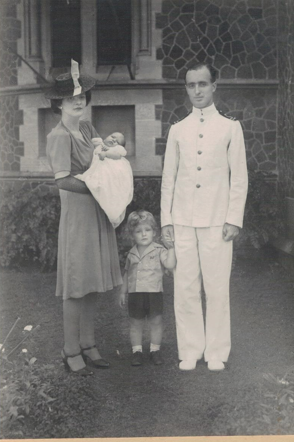 And so it was that my brother and I were both born in India, he in Karachi (later of course Pakistan) and I in Bombay where I was christened.
And so it was that my brother and I were both born in India, he in Karachi (later of course Pakistan) and I in Bombay where I was christened.
When war ended, Daddy signed up for a further year in India so that we three could return on one of the first ships as serving men’s families took precedence over civilians.
We spent an idyllic year with my maternal grandparents in Hertfordshire and were always visiting them when we had a home of our own. My grandfather was a Fyfe from Aberdeen and they had beef cattle, geese, chickens, goats, bees and of course dogs, a vegetable garden, and a beautiful walled garden espaliered with all manner of fruit trees. As a result, we really didn’t suffer the privations of rationing and were able to share liberally with other people in the town. I have very fond memories of sitting with my grandmother, preserving eggs in a 40-gallon drum with some sort of white powder and water which I assume was lime, and churning the milk endlessly in a square glass jar with a handle on top before using paddles to make slabs of butter. Both my parents and grandparents taught me a great deal about self-sufficiency from a very young age.
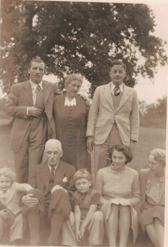 Summer holidays each year were either spent in Lossiemouth on the north east coast of Scotland right beside the links golf course where my grandfather hired a holiday cottage and aunts and uncles and cousins would congregate. The Fyfe family were all excellent golfers with handicaps in single figures – in fact my Uncle Kenneth had a handicap of Plus 1. Sport is definitely in the Fyfe genes. My grandfather played soccer for Scotland, and the same uncle represented Scotland at rugby from 1933-1939 – and even features in the book, Men in Black – 75 years of New Zealand Rugby.
Summer holidays each year were either spent in Lossiemouth on the north east coast of Scotland right beside the links golf course where my grandfather hired a holiday cottage and aunts and uncles and cousins would congregate. The Fyfe family were all excellent golfers with handicaps in single figures – in fact my Uncle Kenneth had a handicap of Plus 1. Sport is definitely in the Fyfe genes. My grandfather played soccer for Scotland, and the same uncle represented Scotland at rugby from 1933-1939 – and even features in the book, Men in Black – 75 years of New Zealand Rugby.
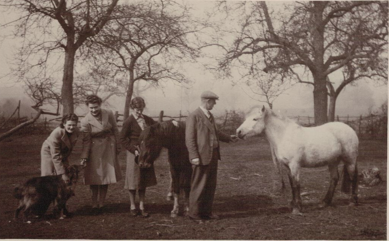 Sometimes, our summer holidays were spent in Worcestershire where my grandmother’s brother was a farmer and was a keen supporter of the Worcestershire County Cricket Club. His daughter, Mary, my mother’s cousin, was secretary of the Malvern hunt so whenever we were there, there were always ponies to ride, cows to milk and water to pump up from the well in the yard – more opportunities to enjoy life in the country. No electronic devices then!
Sometimes, our summer holidays were spent in Worcestershire where my grandmother’s brother was a farmer and was a keen supporter of the Worcestershire County Cricket Club. His daughter, Mary, my mother’s cousin, was secretary of the Malvern hunt so whenever we were there, there were always ponies to ride, cows to milk and water to pump up from the well in the yard – more opportunities to enjoy life in the country. No electronic devices then!
My mother played the piano so, when we were home, there was plenty of music to enjoy, although it was definitely less enjoyable when I learned the violin and spoiled the melodies.
It was an idyllic childhood.
My primary schooldays passed uneventfully and the time came to go to boarding school in Dorset when I was almost 12. I loved school and spent six happy years playing every sport imaginable, playing the piano and violin, singing in the choir, and just keeping my head above water in the classroom. In the winter we played hockey, in the spring lacrosse and in the summer cricket, tennis and swimming. We also played squash and fenced and we were all pretty competitive! At least two hours a day was allocated to sport and/or recreation, winter and summer! It was a shock to leave and be limited to sport only in evenings and on weekends but a more serious time of life had begun, involving tertiary study and work!
I was brought up to obey my parents without question so when my father told me that I could do whatever I wanted with my life but only after I had completed a one-year course in domestic science, so that I would make a good wife, and a one-year secretarial course in case I didn’t find a husband and had to make my own living. I didn’t contemplate disobeying. I studied both courses at The Regent Street Polytechnic in London and the two years were great fun. The secretarial course included languages and law, both of which I loved.
I was playing more serious hockey in Hertfordshire by this time which involved remaining within the County, so going away to university wasn’t really on the cards and I honestly hadn’t ever considered that I had much of a brain! I got a great job in a law firm in Hertford with the most wonderful boss who told me that he would support any mistake I might make – once - and he mentored me as I made my way up through the ranks learning HR management, simple legal executive duties, and accounting.
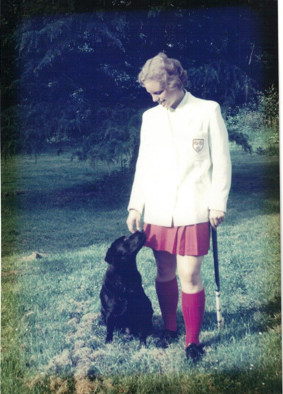 And he was very happy to give me time off when I needed to attend hockey training and play important matches, for Hertfordshire and then for the East of England and finally England involving games against Scotland, Ireland, Wales, Australia, South Africa and Germany. I qualified as a hockey and tennis coach and also found time to play representative tennis and basketball, so life was very good!
And he was very happy to give me time off when I needed to attend hockey training and play important matches, for Hertfordshire and then for the East of England and finally England involving games against Scotland, Ireland, Wales, Australia, South Africa and Germany. I qualified as a hockey and tennis coach and also found time to play representative tennis and basketball, so life was very good!
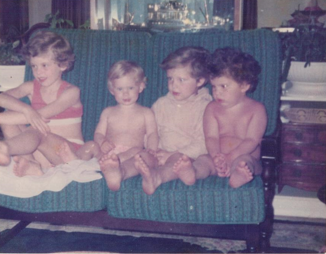 Ken and I married in 1969 and soon had four children in the space of five years.
Ken and I married in 1969 and soon had four children in the space of five years.
After the children arrived on the scene, we frequently spent the summer holidays at Middleton-on-Sea in West Sussex with my father’s step-mother (his mother 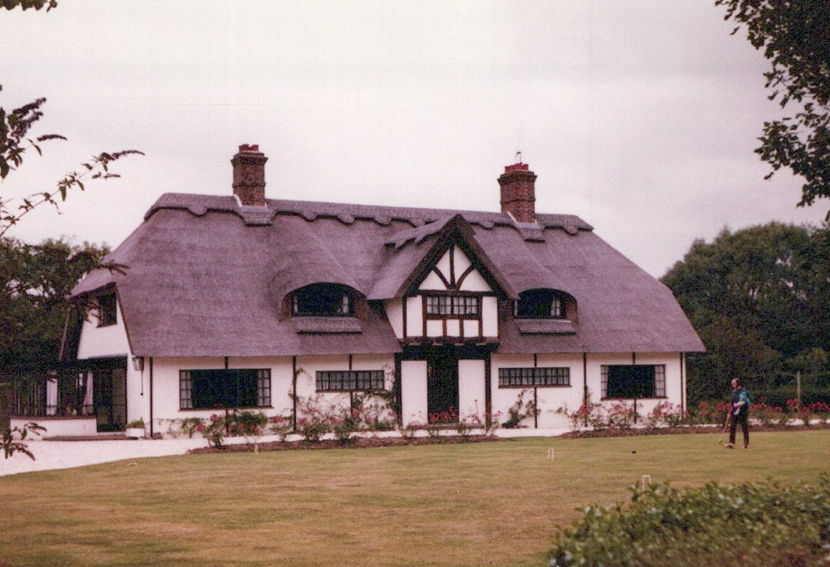 having died). She lived in a beautiful home that was equidistant from the ocean one way and a fabulous sports club the other. And she adored little children so I often found that the moment we arrived, she would kidnap our four and take them for long walks to visit her friends, leaving me to manage the household and make the meals! She was a total treasure and adored by everyone.
having died). She lived in a beautiful home that was equidistant from the ocean one way and a fabulous sports club the other. And she adored little children so I often found that the moment we arrived, she would kidnap our four and take them for long walks to visit her friends, leaving me to manage the household and make the meals! She was a total treasure and adored by everyone.
The house always seemed to be full of aunts, uncles and cousins and it was yet another idyll for the children, generally with family Labradors close by.
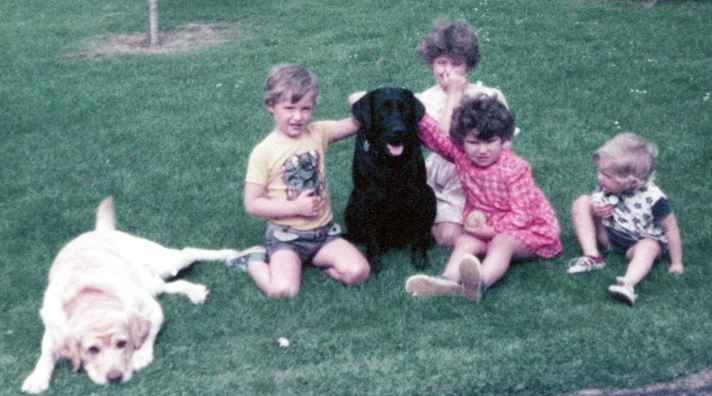 You can imagine how we spent the holidays. It wasn’t the case, of course, but my recollection is of endless days of sunshine, playing croquet on the lawn or French cricket at the beach, swimming, playing sports of all kinds at the thriving sports club where we met up every year with other families who also came to the coast to spend their summers.
You can imagine how we spent the holidays. It wasn’t the case, of course, but my recollection is of endless days of sunshine, playing croquet on the lawn or French cricket at the beach, swimming, playing sports of all kinds at the thriving sports club where we met up every year with other families who also came to the coast to spend their summers.
England was suffering from the effects of The Winters of Discontent in the 1970s and every time I had to give birth there was always the threat of a strike by workers in one industry or another. Quite by chance I was talking to a friend one day and said that I was really fed up with the effect the endless strikes were having on our lives and that ‘for two pins I’d go to New Zealand’! Ken overheard and said he had always wanted to go to New Zealand, and so we embarked on a two-year process of applying. Ken got a job as the financial director of GEC in Porirua, we passed all the medicals and eventually flew into Wellington at the end of November 1979.
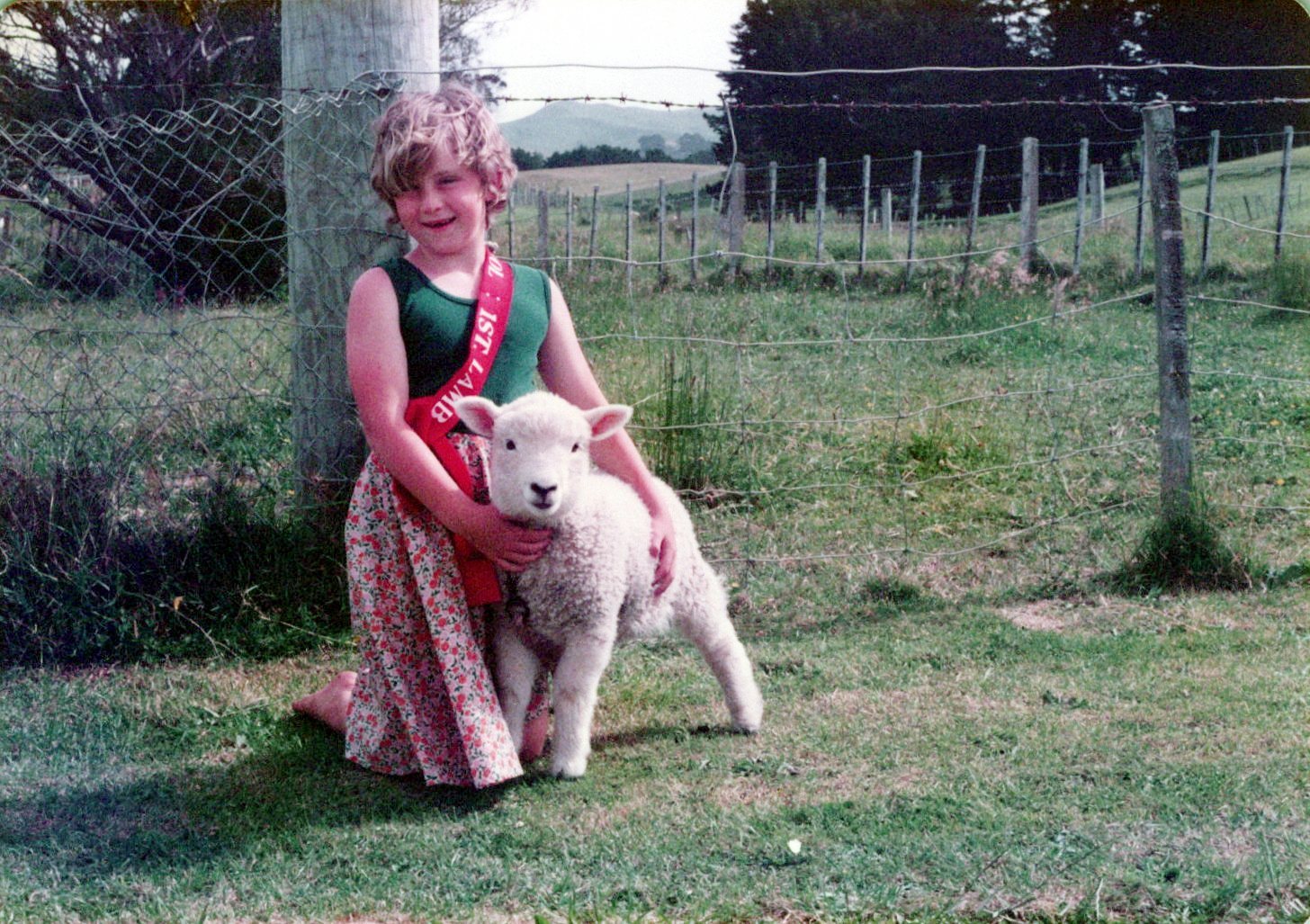 We found a lovely 10-acre block up Murphy’s Road in Pauatahanui, bought 11 black sheep and a ram, some ducks and chickens and thought we’d died and come to heaven. We reared bobby calves and the children showed their pet calves and lambs at Lamb and Calf Day at Pauatahanui School, Suzi winning first prize one year with her ram lamb, Sneaky.
We found a lovely 10-acre block up Murphy’s Road in Pauatahanui, bought 11 black sheep and a ram, some ducks and chickens and thought we’d died and come to heaven. We reared bobby calves and the children showed their pet calves and lambs at Lamb and Calf Day at Pauatahanui School, Suzi winning first prize one year with her ram lamb, Sneaky.
It was a happy and healthy childhood for the four who were under seven when we arrived. They settled into life in the country. Ken went to work and I was a stay-at-home Mum who managed to play tennis and squash and a bit of golf during school hours.
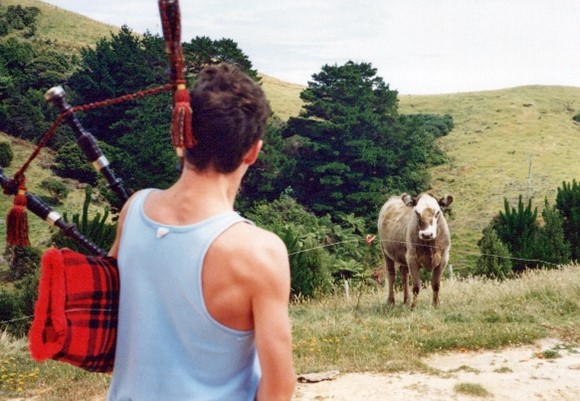 And even though we all worked really hard, there was plenty of time to ‘play’ – literally in Adam’s case, the bagpipes, as he enchanted one of our Murray Grey cattle!
And even though we all worked really hard, there was plenty of time to ‘play’ – literally in Adam’s case, the bagpipes, as he enchanted one of our Murray Grey cattle!
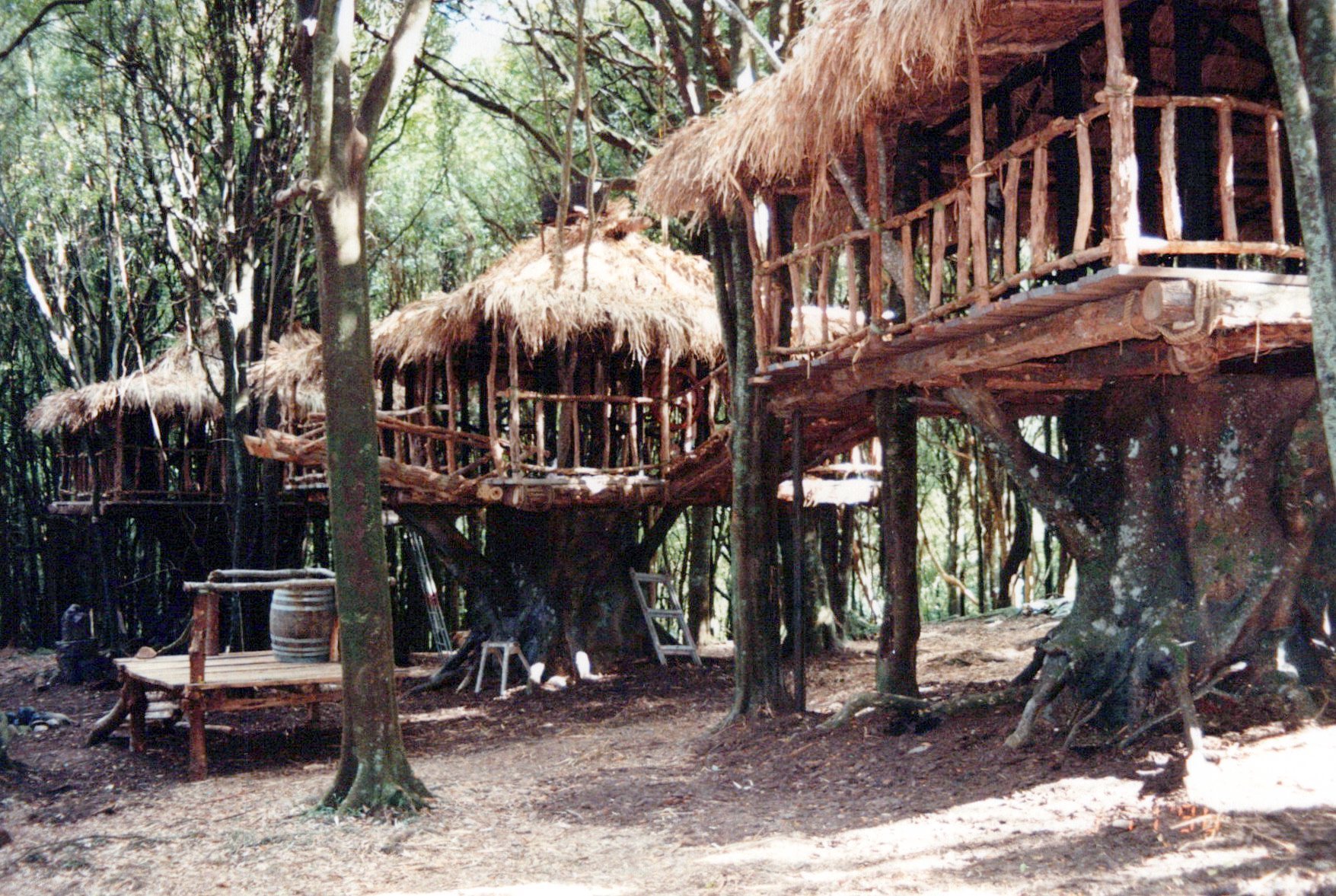 At about this time we were approached by Cloud 9 who asked if they could build a set in our Native Bush for part of their filming of The Swiss Family Robinson and that proved to be a great playground for the children and for lots of families who asked to use the area for their young children’s birthday parties.
At about this time we were approached by Cloud 9 who asked if they could build a set in our Native Bush for part of their filming of The Swiss Family Robinson and that proved to be a great playground for the children and for lots of families who asked to use the area for their young children’s birthday parties.
After only 18 months in our lifestyle block, Ken had become restless. A farmer’s son from the Cotswolds in Oxfordshire, he wasn’t sufficiently challenged counting 12 sheep every day so we bought 600 acres and then began many years of seriously hard work. We had 1500 sheep and about 30 cattle on a very hilly block above Judgeford Golf Course, and when we weren’t mustering in the sheep for crutching, docking, shearing, dipping, or sending stock to market, we were endlessly fencing and scrub cutting. Ken continued his work in the city so a lot of the day-to-day farming fell on my shoulders, especially the five days in the shearing shed every year when I was cook and sole rousie for the shearers, as well as helping Ken with the mustering in and out in the evenings and early mornings. I learned what it meant to be literally bone tired!
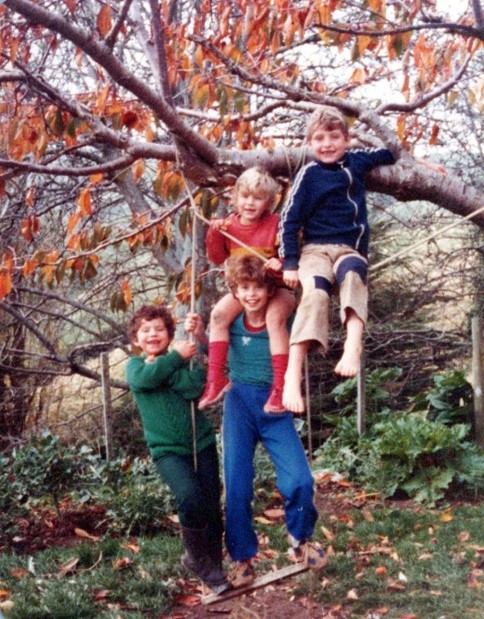 I have to say that our four became excellent farm hands and really enjoyed farm life. Apart from helping with the work, they still had plenty of time to rough and tumble in the great outdoors. It was a happy and healthy life for us all.
I have to say that our four became excellent farm hands and really enjoyed farm life. Apart from helping with the work, they still had plenty of time to rough and tumble in the great outdoors. It was a happy and healthy life for us all.
It’s hard to describe the joy that our four children bring to me, as I’m sure you find with yours. They are all happy, caring, committed people who love each other and their parents. We may be far-flung around the world but we video each other frequently and get together whenever we can. We’re very blessed.
Eventually, when the children grew up a little, and needed me less, I went back to work and got a wonderful job at Chapman Tripp as the HR and Training Manager for 150 partners and staff. Confucius once said that if you find a job you love, you’ll never work a day in your life. I absolutely loved my job and, although I frequently worked 12-hour days, I wouldn’t have changed places with anyone else on the planet. The partners and staff felt like a second family. Despite working long hours, it felt like the right time to get some qualifications so I did a Post Grad DBA part-time at Victoria University and later also became qualified in things like Neuro Linguistic Programming, Counselling and Personality Testing. Fortunately, the children were all at important stages of their own education, so many evenings were spent studying together at the kitchen table.
But all good things come to an end. I resigned at the end of 1992. I was about to reach the 50 milestone and thought the time was right to start a new chapter of my life. I really wanted to focus on training alone, rather than dividing my time between HR and training. So, I launched my own training consultancy which I called Lasting Impact. I was lucky enough to have some wonderful corporate clients over the ensuing years – like Alcatel, Victoria University, Telecom, and OSH, among others.
As you can imagine, the partners and staff at Chapman Tripp were a wonderful and intellectually challenging bunch, and I knew I would miss rubbing shoulders with them enormously on a daily basis. As an extravert, I found the isolation of doing all my workshop creation and preparation alone on the farm quite debilitating, even though running the workshops themselves was always exciting, challenging, and fun.
And so it was, that when I was invited to join the Rotary Club of Plimmerton in February 1993 I knew I had found a new family of wonderful people, people like you who continue to offer generous friendship, continual stimulation and intellectual challenge.
But that’s a story for another time …
